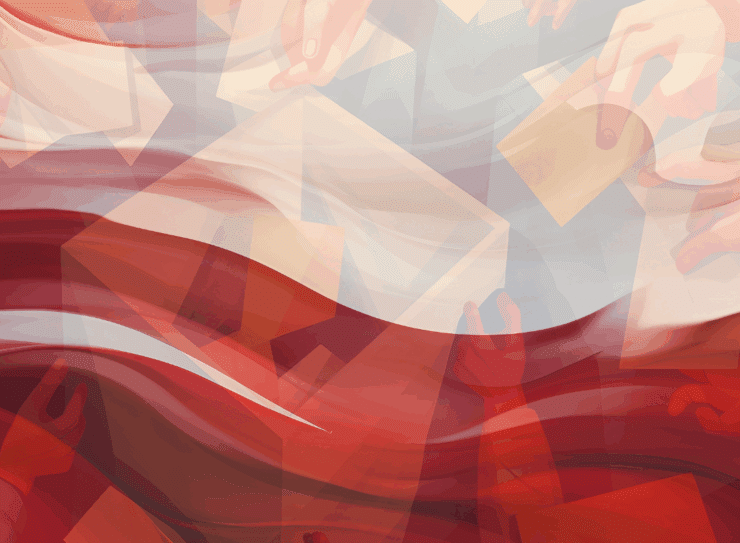4 June 2025
Poland: Divided country, divided society
Over 10 million Poles woke up on Monday morning, June 2 and faced the news that Karol Nawrocki won the presidential election.

Over 10 million Poles woke up on Monday morning, June 2 and faced the news that Karol Nawrocki won the presidential election.

By Dr. Magdalena M. Baran, senior fellow at ELF
Over 10 million Poles woke up on Monday morning, June 2, worried, surprised, irritated, resentful, frustrated, shocked, and to what extent offended by the “world” and their fellow citizens. The first, overly optimistic reaction to the exit poll results, giving the president of Warsaw a 0.6% advantage over his PiS-supported rival, was extinguished after just two hours by the results of the late poll, and then by the all-night observation of the results coming in from the next electoral commissions. Karol Nawrocki won the presidential election.
The media asked questions about the quality of democracy, about the fulfillment of promises made to citizens during the 2023 parliamentary elections, about restoring the rule of law, holding the PiS political party to account, about the scale of human rights protection, and finally about possible restrictions on our freedom, which will be influenced by the new presidency. Other voices asked about the quality of leadership itself and the impact of the new situation (although basically replicating the previous one with President Andrzej Duda) on the roles of Poland and the EU.
Why Nawrocki won
Another 10 million or so greeted Monday morning with joy at their candidate’s victory. The difference, with an almost record turnout, was really small: only 369.591 votes difference. It is this difference that clearly shows how divided Poland is today; how divided Poles are; what level of polarization has reached, de facto dividing the country in half. This division takes the form of a dramatic rift, not only on a political or social level, but also on a family level, when it is increasingly difficult for parents and children to sit at the same table. The election promise of great reconciliation has not only not been fulfilled, but as a result of the last campaign, will require even more work. The slogan “we are sewing Poland together” or “agreement, we are different” will be even more difficult to implement today.
Less than 2% of votes decided that Rafał Trzaskowski did not defeat Karol Nawrocki. The politically experienced mayor of Warsaw lost the “race for the palace” to the conservative nationalist, a director of the Institute of National Remembrance, devoid of any political background and experience, who calls himself the “Chairman’s decision” (Jarosław Kaczyński, head of PiS). The illumination of the past, which includes the documented story of the unfair takeover of an elderly man’s apartment, hooliganism, the connections with the criminal world, or accusations of pimping reported by the portal onet.pl, did not work. So what made Nawrocki win?
Trzaskowski’s campaign had shortcomings, as well as mistakes that are hard to forgive, such as the first presidential debate in Końskie, to which Trzaskowski initially invited only the rival considered the main one, omitting the other candidates. There was no message addressed to the young, whose political expectations (despite years of Trzaskowski organizing a youth festival called Campus Polska) were not satisfied.
The problems of the countryside were also omitted. Voter groups drawing attention to their fatigue with the long-term domination of the political duopoly of PO and PiS were not taken into account. Trzaskowski’s turn to the right and attempts to win over the moderate right-wing electorate were also not a good idea. Trzaskowski was also burdened by the shortcomings of the current coalition government, whose actions are met with dissatisfaction among voters.
It was also about values, yet not a simple dispute between liberals or centrists versus the conservatives or nationalists. This election also showed that a lot of regular people do not see the values of liberal democracy, based on specific pillars and human rights, as a priority. This lack of understanding, this specific numbness that accompanies almost half of Poles today, concerns how our fellow citizens could decide to entrust the country to a man with such a past.
How, in a few months, a widely unknown man managed to capture the imagination and votes of a significant part of the nation. We will ask the question “how is this possible” many more times, and it is this question that stands at the beginning of the next election campaign (because the campaign begins the day after the election is won or lost). The society that gave power to the then democratic opposition on October 15, 2023, showed Donald Tusk’s government a yellow card during the presidential elections. There will be time for explanations.
Today, other questions are multiplying. What about the role and strength of Poland in the EU, about the possibility of actually governing, and not just administering the country for the next 2.5 years (until the next parliamentary elections); about the scale of work “to be done” by politicians, non-governmental organizations, the media and society. About finding a way to defend liberal democracy, so that one day we do not wake up in nationalist captivity.
In moments of sporting defeat, to encourage their team, Polish fans used to sing: “Poles, nothing happened”. However, today, on the side of supporters of today’s coalition, it is hard to find someone who would support Rafał Trzaskowski’s election defeat with a similar refrain.